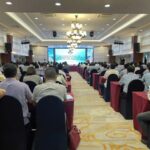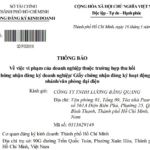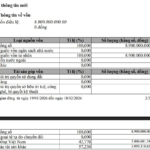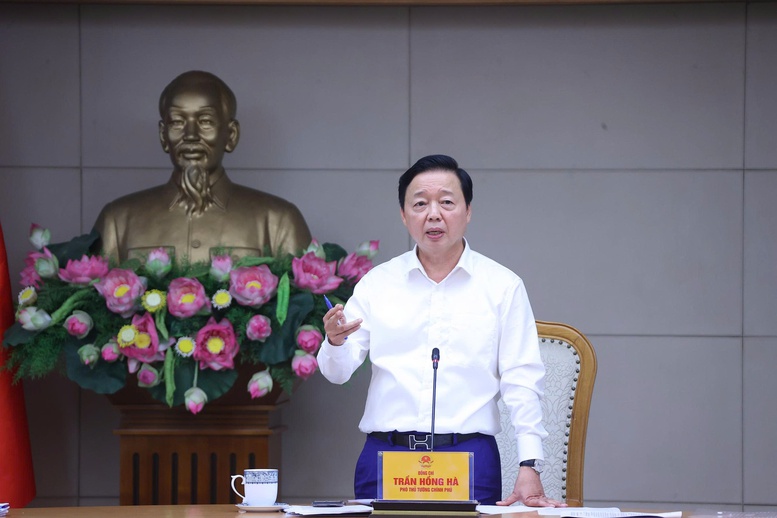
Deputy Prime Minister Tran Hong Ha chaired the National Steering Committee meeting on the situation, results of the fight against illegal, unreported, and unregulated (IUU) fishing – Photo: VGP/Dinh Nam
The Deputy Prime Minister emphasized that the lack of fundamental changes in the fight against IUU fishing is not just a technical issue but also a matter of management thinking, organizational methods, and, most importantly, political responsibility in ensuring legal discipline and national prestige.
“This is our responsibility, and the causes lie within us. Therefore, the solutions must also come from us,” said the Deputy Prime Minister.
The root causes of this situation include domestic overfished waters, loose licensing management of fishing vessels, and a lack of alternative livelihoods for fishermen. Meanwhile, the deployment of vessel monitoring systems (VMS) and satellite monitoring has been mostly coercive and has not gained genuine consensus from the people.
The Deputy Prime Minister requested a fundamental shift in thinking and approach across the system to address the root causes of IUU fishing violations. This is not just about “meeting EU requirements” but about revitalizing a vital economic sector, sustaining sustainable exports, and maintaining the country’s brand in the international market.
Instead of merely issuing documents, authorities need to set clear and substantive goals: reducing violations, protecting fishermen, stabilizing livelihoods, and affirming maritime sovereignty.
“The fight against IUU fishing cannot be a campaign or a coping strategy. It is a national responsibility. We must tell fishermen that monitoring devices are meant to protect and support them and their vessels in case of incidents, not to encourage them to go to sea at all costs. When people understand this, they will voluntarily comply,” the Deputy Prime Minister emphasized.
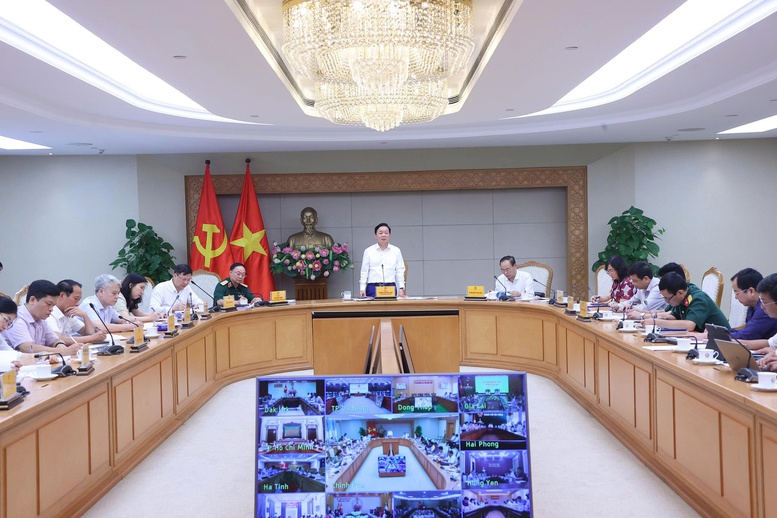
The Deputy Prime Minister requested a fundamental shift in thinking and approach to address the root causes of IUU fishing violations – Photo: VGP/Dinh Nam
Vietnam has the opportunity to lift the “yellow card” imposed by the EC
Reporting at the meeting, Deputy Minister of Agriculture and Environment Phung Duc Tien said that as of June 30, 2025, the number of fishing vessels nationwide registered and updated on the National Fisheries Database (VNFishbase) was 81,719. Localities are reviewing, compiling, and updating data on fishing vessels with the national population database; some localities have completed boat identification, such as An Giang and Ca Mau; and are creating a list to monitor and control vessels that do not meet the requirements for fishing activities.
Currently, 28,164 fishing vessels of 15 meters in length or more have been equipped with vessel monitoring systems (VMS), achieving 99.06%.
Weekly, localities review and update the list of high-risk IUU fishing vessels based on VMS data for competent authorities to focus on inspection, control, and handling of violations (if any).
Daily, the Ministry of Agriculture and Environment provides a list of fishing vessels of localities operating near the boundaries and those with VMS disconnection near the boundaries with neighboring countries to monitor, contact the vessel owners and captains, and warn them not to violate IUU fishing regulations or cross the permitted fishing boundaries.
As of June 30, 2025, for vessels of 24 meters in length or more, the number of vessels with VMS disconnection of more than 6 hours was 3,098 (a decrease of 5,833 vessels)/619 vessels (a decrease of 531 vessels), and the number of vessels with VMS disconnection of more than 10 days at sea was 24 vessels (a decrease of 110 vessels)/21 vessels (a decrease of 71 vessels). The number of vessels crossing the permitted fishing boundaries was 4 vessels (a decrease of 5 vessels)/4 vessels (a decrease of 3 vessels).
The number of fishing vessels and fishermen detained and handled by foreign countries decreased by 20 vessels/129 fishermen compared to the same period.
The electronic Catch Documentation and Traceability (eCDT) system has been deployed at 94 landing points, an increase of 32 points compared to the same period in 2024. From the beginning of the year to June 30, 2025, there were 95,806 vessel departures (an increase of 80,218 vessels)/25,759 vessels (an increase of 17,377 vessels), 90,121 vessel arrivals (an increase of 81,344 vessels)/23,407 vessels (an increase of 19,405 vessels), and a catch volume of 280,981 tons (an increase of 231,761 tons) through the ports…
There are still 486 unregistered fishing vessels nationwide, and 16,725 (20.2%) vessels of 6 meters in length or more do not meet the requirements for operation (unregistered, uninspected, unlicensed, or without VMS).
Approximately 15,000 fishing vessels have not updated their information correctly and fully on the National Fisheries Database (VNFishbase), and the Vessel Monitoring System (VMS) is linked to the National Population Database (VNeID) (missing or inaccurate citizen identification information or inaccurate vessel registration information…).
Some localities have not allocated sufficient resources (funds, personnel, equipment…) to implement management measures for fishing activities at ports, deploy the eCDT system, patrol and control fishing vessels at sea, inland waterways, river mouths, islands…, and have not taken effective measures to prevent and handle cases of fishing vessels not landing at designated ports as required to unload seafood products.
The number of fishing vessels and businesses using the eCDT system is still low compared to the actual situation; currently, only about 25,000 vessels use eCDT for departure and arrival procedures.
The functional forces are making efforts to strictly handle cases of illegal fishing in foreign waters. However, the results of handling violations of VMS disconnection at sea and crossing permitted fishing boundaries remain low compared to the number of detected cases.
The update of information on IUU fishing violations in the administrative sanction data in the fisheries sector as prescribed by localities is not yet comprehensive and timely.
“Vietnam has the opportunity to lift the ‘yellow card’ imposed by the EC if IUU fishing prevention activities are maintained and serious violations are strictly handled: violations of foreign waters, crossing boundaries, and VMS disconnection…”, said Deputy Minister Phung Duc Tien.
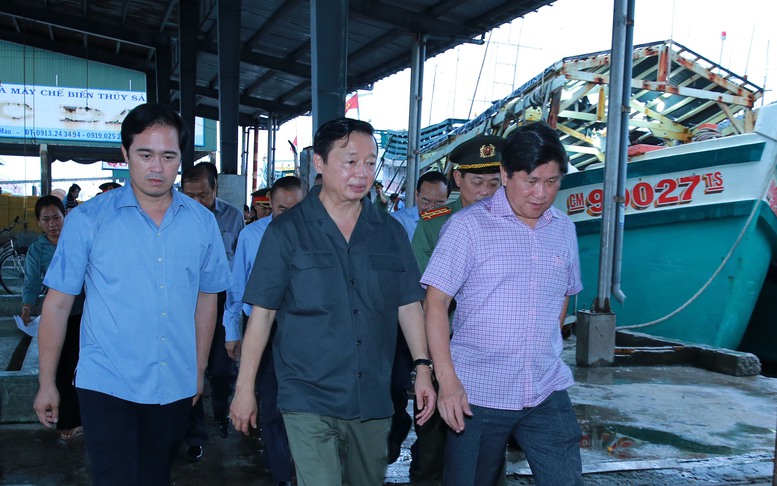
Deputy Prime Minister Tran Hong Ha visits Song Doc Port in the afternoon of October 16, 2024 – Photo: VGP/Dinh Nam
Directly warning vessel owners and captains of violations
Mr. Tran Dinh Luan, Director of the Directorate of Fisheries and Fisheries Surveillance (Ministry of Agriculture and Environment), said that currently, data systems such as VMS (vessel monitoring system) and VNFishbase (national fisheries database) have been connected and shared with many functional forces, including public security, border guards, coast guards, and central and local fisheries surveillance forces. This data is used collaboratively to support port authorities in checking and monitoring the activities of fishing vessels entering and leaving ports.
Checking the fishing logbooks and voyage data of fishing vessels has become faster, taking only 5 to 10 minutes per vessel. Thanks to electronic systems, port officials can cross-reference voyage data, coordinates of fishing grounds, and catch volume with the data declared by the vessels.
Regarding the activity of transshipment of seafood at sea, Mr. Tran Dinh Luan acknowledged that monitoring is challenging. Many vessels intentionally fish in the wrong areas and do not record their fishing logs, then transfer the catch to other vessels to legalize the source. This causes difficulties in tracing the origin of seafood and implementing IUU fishing prevention regulations. Using VMS and satellite data to identify vessels engaged in fishing and transshipment at sea is an initial basis for detecting illegal transshipment of seafood.
The Ministry of Agriculture and Environment is coordinating with the Ministry of Public Security to integrate population data into the VMS system, expected to be completed in August 2025, to directly warn vessel owners and captains of violations.
Vietnam Post and Telecommunications Corporation (VNPT) is currently supporting the upgrade of software and the development of functions such as warning when a vessel turns off the monitoring device, automatically notifying the nearest functional forces at sea to promptly handle the situation.
Regarding the handling of violations, the issuance of violation records and fines at the site still depends on the capacity and initiative of local officials.
The coordination between forces such as fisheries surveillance, border guards, and coast guards mainly involves signing working records and has not yet had an official legal document regulating responsibilities, authority, and centralized command mechanisms. This leads to situations where control centers, despite having violation data, lack the authority to issue orders for coordination, inspection, or handling.
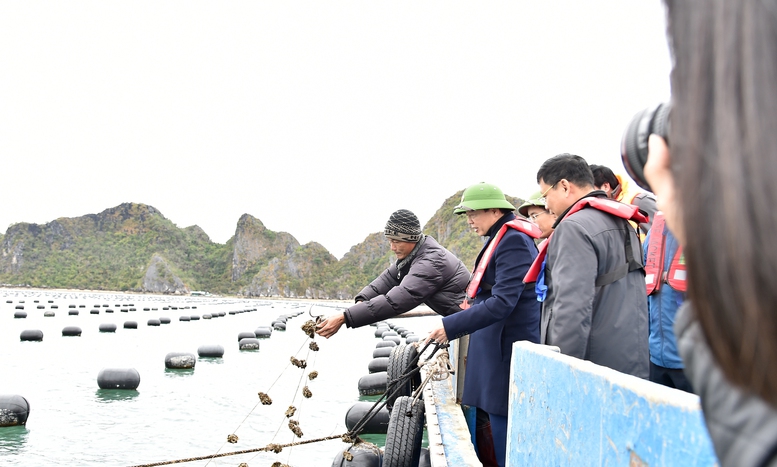
Deputy Prime Minister Tran Hong Ha visits the Trung Nam Aquatic Product Cooperative in the morning of February 7, 2025 – Photo: VGP/Hai Minh
Enhancing penalty authority through electronic data to avoid “circular paperwork”
At the conference, representatives of localities (An Giang, Ca Mau, Nghe An…) made many recommendations to improve the efficiency of management, monitoring, and handling of violations in fisheries exploitation.
The localities emphasized the need to strictly handle intentional violations such as removing or disconnecting vessel monitoring devices (VMS) and promote the initiation of criminal proceedings in eligible cases to increase deterrence.
In terms of technology, many provinces proposed integrating existing software, building an automatic warning system when a vessel loses connection, and ensuring interconnectivity between forces.
Additionally, localities proposed that the Ministry of Foreign Affairs support the collection of evidence from relevant countries to serve the investigation and handling of cases of fishing vessels violating foreign waters. The long-term solution emphasized is to develop a comprehensive program for the transformation of fishermen’s livelihoods to reduce the risk of re-violation.
Finally, the provinces proposed decentralization and autonomy in developing specific projects suitable for the characteristics of each locality, especially in port planning, fishing ground allocation, and fleet management.
The Deputy Prime Minister acknowledged the recommendations and emphasized: “The central government provides guidance, while the development of livelihood transformation projects and their implementation must be initiated by localities.” He also requested that localities propose specific projects based on port planning, allocated fishing grounds, and fleets to protect aquatic resources sustainably.
Leaders and representatives of ministries and sectors also proposed many key solutions to improve the efficiency of IUU fishing prevention, aiming to lift the “yellow card” imposed by the European Commission (EC).
Lieutenant General Thai Dai Ngoc, Deputy Chief of the General Staff of the Vietnam People’s Army, emphasized the need to complete a shared database of fishing vessel violations, ensure timely sharing with forces at sea, and build model fishing ports. Localities should inspect legal documents before vessels depart, integrate wind power and aquaculture planning to create sustainable livelihoods for fishermen.
The representative of the Ministry of Justice proposed completing the legal framework, enhancing penalty authority through electronic data to avoid “circular paperwork,” tightening the management of seafood processing and export of violating vessels, and coordinating closely between sectors.
The Ministry of Agriculture and Environment should promptly complete three decrees related to sanctions, support for offshore fishing, and the promotion of the Fisheries Surveillance Force development project.
Strong and clear laws with thorough decentralization
Concluding the conference, Deputy Prime Minister Tran Hong Ha affirmed that implementing measures to combat IUU fishing is not just about lifting the “yellow card” imposed by the EC but, more importantly, ensuring the sustainable development of Vietnam’s fisheries sector, protecting aquatic resources, and securing long-term livelihoods for fishermen.
According to the Deputy Prime Minister, the legal system on fisheries, environmental protection, and marine conservation is already in place, but the problem lies in the implementation, which is still formalistic and lacking in substance.
The Deputy Prime Minister requested the Ministry of Agriculture and Environment to review and complete legal documents, especially the amendment of three decrees on policies to support offshore fishing and administrative sanctions. The laws and decrees must be strong and clear, with thorough decentralization to localities in vessel management, port inspection, and violation handling. The scope of legal liability should be expanded to include enterprises in the processing and trading sectors. Sanctions should be transparent, timely, and clearly delegated to avoid shirking responsibility.
The Deputy Prime Minister emphasized the urgent need to quantify and measure the achievement of IUU fishing prevention goals: no vessels violating foreign waters, a comprehensive vessel monitoring system, protection of fishing grounds and livelihoods…
Ministries and sectors should review all procedures, establish responsibilities and authority, and implement post-inspection mechanisms. There must be clear and authoritative command orders that are strictly followed by the forces, avoiding the situation of “no one can be held accountable for violations,” changing the mindset of “issuing many documents is considered a task completed.”
The Ministry of Agriculture and Environment and the Ministry of Public Security should coordinate to soon develop regulations requiring the mandatory installation of in-trip cameras on fishing vessels, especially for transshipment activities and offshore fishing. “All activities of fishing vessels must be monitored from the time they leave the port, including voyage data, catch volume, until they return to the port.”
Ending the situation of “violations occur but it is unclear who will handle them”
Affirming that digital transformation is a pillar for implementing monitoring, traceability of aquatic resources, and control of fishing vessels, the Deputy Prime Minister suggested integrating multi-purpose data, connecting the VMS system, electronic logbooks, population data, port control, satellites, and AIS positioning. The database must allow two-way interaction, early warning, voyage tracking, and the application of artificial intelligence and blockchain technology for data security and verification. Vessel monitoring should not only aim to “handle violations” but also to “guide, warn, and support” fishermen.
Vietnamese management and professional agencies need to proactively cooperate with international organizations to learn from their experience and access technological solutions, “learning and acting quickly and correctly” from successful models.
The Deputy Prime Minister assigned the Ministry of National Defense to combine the task of national defense with the task of monitoring fishing activities in border sea areas where fishing vessel violations of IUU fishing regulations frequently occur. The Coast Guard, Border Guard, and Fisheries Surveillance forces must coordinate with local authorities, unify focal points, and take specific responsibility to end the situation of “violations occur but it is unclear who will handle them” through clear command and coordination mechanisms.
The Deputy Prime Minister suggested that localities develop specific projects on
Illegal Fish Trade: Accountability for Processors and Traders
To combat illegal fishing, Deputy Prime Minister Tran Hong Ha has called for an expansion of legal accountability. The deputy prime minister emphasized the need to hold all parties involved in the fishing industry accountable, including fishermen, vessel owners, and those involved in the supply chain, to ensure sustainable and legal fishing practices. This proactive approach aims to protect Vietnam’s marine resources and promote responsible fishing, sending a clear message that illegal activities will not be tolerated.
Determined to Remove the EC’s “IUU Yellow Card”
On November 15, in the city of Nha Trang, Khanh Hoa province, the Fisheries Surveillance Department, under the Ministry of Agriculture and Rural Development, chaired a meeting in collaboration with relevant ministries and sectors. The event aimed to provide technical guidance on combatting IUU fishing and prepare for the 5th working session with the EC for 28 coastal provinces and cities.
The Battle Against Unregulated Fishing: Cracking Down on the “Three Nos” of Thanh Hoa’s Fishing Fleet
In recent times, authorities in Thanh Hoa province have stepped up their patrols and inspections of the sea, river mouths, beaches, and fishing ports. They have been steadfast in their decision to not allow fishing vessels to operate without the necessary procedures, paperwork, and equipment as stipulated by regulations. Vessels that violate the IUU fishing regulations will be dealt with accordingly.
“Sustainable Development of the Blue Economy: A Visionary Approach”
On September 16, Prime Minister Pham Minh Chinh chaired a meeting at the Government Office with relevant ministries, branches, and leaders to thoroughly review the implementation of Resolution 36 on the Strategy for Sustainable Development of Vietnam’s Marine Economy by 2030, with a vision extending to 2045. The discussion also revolved around pertinent matters outlined in the Resolution of the 13th Party Congress.


